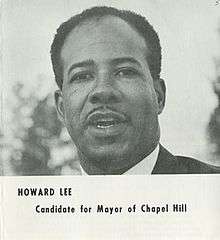Howard Nathaniel Lee
Howard Nathaniel Lee (born July 28, 1934 in Georgia) is an American politician who served as Mayor of Chapel Hill, North Carolina, from 1969 to 1975.[1] He was the first African-American mayor elected in Chapel Hill, and the first African American to be elected mayor of any majority-white city in the South.[2]
Howard Lee | |
|---|---|
 Lee in a pamphlet published during his 1969 mayoral campaign | |
| Chair of the North Carolina State Board of Education | |
| In office 2003–2009 | |
| Governor | Mike Easley Bev Perdue |
| Preceded by | Phil Kirk |
| Succeeded by | William C. Harrison |
| Member of the North Carolina Senate from the 16th district | |
| In office 1997–2003 | |
| Preceded by | Fred M. Hobbs |
| Succeeded by | Eric Miller Reeves |
| In office 1991–1995 | |
| Preceded by | Wanda Holder Hunt |
| Succeeded by | Fred M. Hobbs |
| 28th Mayor of Chapel Hill, North Carolina | |
| In office 1969–1975 | |
| Preceded by | Sandy McClamroch |
| Succeeded by | James Wallace |
| Personal details | |
| Born | Howard Nathaniel Lee July 28, 1934 Lithonia, Georgia, U.S. |
| Political party | Democratic |
| Spouse(s) | Lillian Wesley ( m. 1962) |
| Alma mater | Fort Valley State College |
| Military service | |
| Allegiance | |
| Branch/service | |
| Years of service | 1959–1961 |
Early life and education
Howard Nathaniel Lee was born to Howard Lee and Lou Temple on July 28, 1934, on a sharecropper's farm outside Lithonia, Georgia.[3] Lee graduated from Bruce Street High School in 1953, and began his freshman year at Clark College, a historically black college of Atlanta that fall. Lee transferred to Fort Valley State College in 1956 and graduated in 1959, the first member of his family to receive a college diploma.
Lee was drafted into the U.S. Army during the summer of 1959 and completed basic training at Fort Benning, Georgia. Lee received medical corpsman training at Fort Sam Houston, Texas, before being stationed at Fort Hood. While at Fort Hood, Lee organized two sit-ins in the town of Killeen to protest segregated public facilities. The second sit-in was reported back to Fort Hood, and Lee was stationed in Korea the next week. Lee served as an ambulance driver and assistant company clerk at Camp Casey until his honorable discharge in 1961.
Lee moved to Savannah, Georgia, where he served as a juvenile probation officer, and married Lillian Wesley in 1962. They moved to North Carolina in 1964, where he did graduate study, earning a master's degree in social work from the University of North Carolina at Chapel Hill. In 1965, he joined the faculties of Duke University and North Carolina Central University.
Political career
After encountering racial tension in his predominantly white Chapel Hill neighborhood, Lee decided to enter local politics.[4] In February 1969, Lee announced his mayoral candidacy. The ensuing election saw a record 4,734 votes cast. On May 6, 1969, Lee was elected mayor of Chapel Hill. He was the first African American to be elected as mayor in a majority-white city, and the first to be elected to such a position in the South since Reconstruction. He won by a narrow margin but was re-elected twice, earning increasing percentages of the vote: 64 percent in 1971 and 89 percent in 1973.[5]
In 1976, Lee sought the Democratic Party nomination for Lieutenant Governor of North Carolina, but was defeated in the primary election. In 1977, Governor Jim Hunt appointed Lee as the Secretary of the North Carolina Department of Natural Resources and Community Development, a post which he held until 1981.
Lee returned to electoral politics in 1990 when he was elected to the North Carolina Senate. He served from 1990 to 1994, and again from 1996 to 2002. While in the Senate, he concentrated particularly on issues affecting public education.
On May 1, 2003, the North Carolina State Board of Education elected Lee as its chairman, succeeding Phil Kirk. In 2009, Gov. Beverly Perdue appointed Lee as the new executive director of the N.C. Education Cabinet, composed of leaders of public schools, community colleges, and public and private universities. This meant Lee had to give up his seat on the Board of Education.[6]
Lee also served as a member of the North Carolina Utilities Commission, having been appointed by Governor Mike Easley on April 1, 2005.
In 2009, Howard and Lillian Lee were nominated as "Town Treasures" by the Chapel Hill Historical Society[7]
Non-profit work
In his retirement, Lee founded the Howard N. Lee Institute, which "focuses on erasing the achievement gap and improving academic performance for minority males."[8]
References
- "Mayors of Chapel Hill" Archived 2012-11-05 at the Wayback Machine, "Town of Chapel Hill"
- "Happy 80th Birthday, Howard Lee!". Chapel Hill Magazine. 2014-06-26. Archived from the original on 2015-09-07. Retrieved 2015-06-14.
- "Biographical Conversations with Howard N. Lee" Archived 2017-07-08 at the Wayback Machine, "UNC TV"
- Thomas, Harry, "Howard Lee: A Historical Mayoral Election", "Documenting the American South"
- "This Month in North Carolina History May 1969 - Howard Lee". Archived from the original on 4 November 2011. Retrieved 14 April 2013.
- News & Observer: "Power shifts at public schools" Archived 2009-01-30 at Archive.today
- http://www.chapelhillhistoricalsociety.org/en/2011/pdf/lillian_howard_lee.pdf
- "Archived copy". Archived from the original on 2013-12-18. Retrieved 2012-05-29.CS1 maint: archived copy as title (link)
External links
- Howard Lee Institute
- Oral History Interview with Howard Nathaniel Lee from Oral Histories of the American South
- Finding Aid: Billy E. Barnes Photographic Collection, 1959-1996, in the North Carolina Collection Photographic Archives, UNC-Chapel Hill